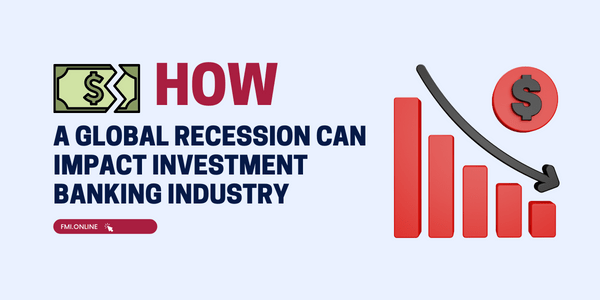A recession is a macroeconomic event marked by substantial economic decline in a region. It is identified by a fall in GDP for two successive quarters, accompanied by slow trade and industrial activity, and a rise in unemployment.
One of the most noted recessions in history was the Great Recession of 2008 in the United States. It was a result of the collapse of the country’s housing bubble, which led to a credit crunch in the global economy. In its duration of 18 months, the unemployment rate doubled from 5% to 10%.
Clearly, a recession has significant repercussions for those trying to enter the job market. With predictions of a recession risk upcoming anywhere in the next two years, if you’re looking to launch a career in finance, here are a few ways you can prepare yourself:
1. Choose a field that is relatively immune to recession
In the finance industry, this might seem like a far-fetched option yet it isn’t entirely so. Here are some areas you can look to work in despite a recession:
- Stressed Asset Management
Since the last recession especially, banks and most financial institutions have regularly reported stressed assets on their books. During healthy economic activity, these may not be in the limelight but during leaner times, stressed asset managers are expected to recover more from these default assets.
These positions are open throughout the year and carry more weight during the time leading up to a recession. So, if this is something you can imagine yourself doing, it’s worth looking into.
- FinTech
Financial technology is a hot field in finance. While not fully recession proof, it is attracting applicants because of its massive growth and constant need for resources. Investors are pouring money into fintech startups, and banks too keep launching their fintech arms. Hence, recession or not, this is an area any financial services aspirant must keep their eyes on.
- Client-Facing Finance Roles
Even with the advent of AI, finance is a field that requires substantial relationship building with clients. If this is your strong suit, you should work on enhancing your communication skills so you can set yourself apart in roles that require client management. Relationship roles abound in corporate banking, retail banking, investor relations, investment banking, financial advisory and so on.
2. Start researching and planning your target companies
At a time like a recession, desperation and despair can consume most people. To avoid being in such a situation, you should try to plan ahead as much as you can. Pick a list of up to 10 companies that are your true top choices.
Research them thoroughly and deeply to ensure that you don’t miss any opportunity to network with them, be it through emails or career events at your university, even if they don’t have immediate openings.
This will help you become a familiar name and face among the recruiters at the organisation and set you up as a passionate and driven professional. In case a position opens up and your credentials are a fit, they will remember to consider you.
3. Reach Out to Your Network
Recession is a time that affects everyone in one way or the other. Hence, your network empathises and understands what you may be experiencing. Reaching out to them would be better than sending in one job application after the other and hearing back nothing.
Be open-minded, flexible, and hopeful of the possibility that any connection can lead you to the role of your choice or something close to it. It might be an internship that becomes the segue to your new job or a different role suited entirely to your skill set. Hence, never give up on connecting or reaching out to a member of your network.
Conclusion
A recession is not a favourable time for job applicants or companies. Yet, if you’re in this situation, you must focus your energy on what you can do. Finding jobs that are in recession-proof fields, being proactive in your job search and communication with potential companies, and maintaining and harnessing the power of a solid network are some things you can do to launch your finance career during an economically challenging time.









 60+ hours
60+ hours 9 courses
9 courses



